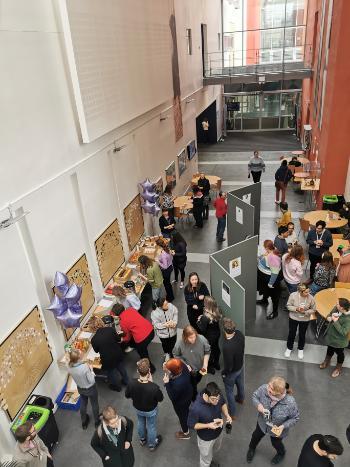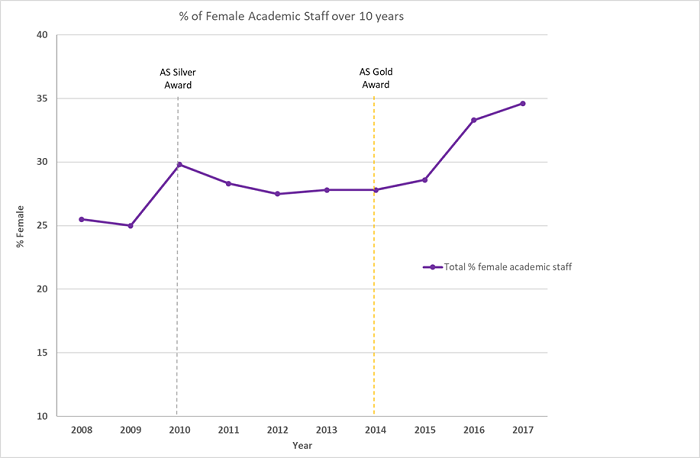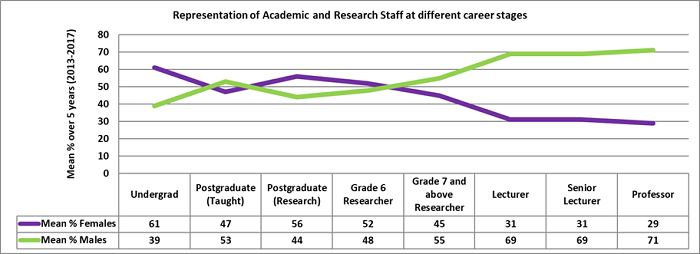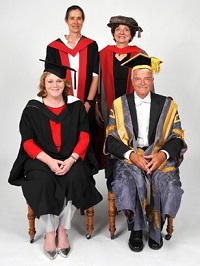Gender equality
Advance HE's Athena SWAN Charter was established in 2005 to encourage and recognise commitment to advancing the careers of women in science, technology, engineering, maths and medicine (STEMM) employment in higher education and research.
In May 2015 the charter was expanded to recognise work undertaken in arts, humanities, social sciences, business and law (AHSSBL), and in professional and support roles, and for trans staff and students. The charter now recognises work undertaken to address gender equality more broadly, and not just barriers to progression that affect women.
The Department of Biology has held an Athena SWAN award since 2006 (Silver in 2006, Gold since 2014, with the Gold award most recently renewed in 2024). It was the first Biology Department in the UK to receive a Gold award and the Department continues to demonstrate its commitment to the UK Athena Swan Principles.
Our ethos is to support all staff and students to reach their full potential.
We believe that poor workplace practices disproportionately discriminate against women, and that good practices benefit all and allow all our staff and students to reach their full potential.
Biology Athena SWAN Contacts:
Elva Robinson, Biology Athena SWAN Academic Lead - elva.robinson@york.ac.uk
Angela Lipscomb, Deputy Head of Faculty Operations - angela.lipscomb@york.ac.uk
Events
International Women's Day - 8 March 2023
To support this year's campaign, the Department of Biology asked staff and students to submit information about a woman who is inspirational to them, to celebrate International Women’s Day. The profiles submitted ranged from past figures such as Beatrix Potter and Frances Oldham Kelsey through to present figures such as Sarah Wanless, family relatives and colleagues.
We unveiled our line-up of inspirational women at our Athena Swan/International Women’s Day coffee and cake session on 8th March!

Case Studies
Becca Neale is an Apprentice Mechanical Workshop Technician in the Biology Department. Read about her experience as an apprentice.
Athena SWAN
Find out about the action plan that we committed to as part of our Athena SWAN Gold Award application in 2018:
Biology Gold AS Application Nov 2018 (PDF ![]() , 5,367kb)
, 5,367kb)
We are especially proud of the following impact made since our Silver award in 2006:
1. Sustained success in increasing the number of female academics
Since 2014, our AS activities have increased female academic staff from 28% to 35%. Increases are most pronounced for lecturers, where female lecturers have increased from 28% to 41%, associated with our actions to increase the number of applications from women, e.g. through revised candidate briefs (resulting in a 7% increase in applications from women for lectureships), having observers at shortlisting meetings (Smith et al. BioScience (2015) 65: 1084-1087), and a culture of regularly assessing the gender split of shortlists.

2. Successfully supporting women's careers and stemming the leaky career pipeline
Our actions to proactively encourage staff to apply for promotion, revised PDRs, and greater transparency in the promotions process, has resulted in more women being promoted. Our actions have resulted in 89% of females successfully applying for promotion in the last 7 years compared to 27% previously, and we have removed gender bias in higher success rates that previously favoured men.
We have stemmed the career pipeline leak of females from UG to PGR (both now ~60%F), and from Researcher (48%F) to L (41%, was 28%), that we had recognised as a crucial career pinch point, through our actions to support PDRA careers, and improved recruitment practices.

3. Beacon activities to share best-practice
We have hosted and given seminars at other Institutions to discuss our Athena SWAN journey ‘going for gold’, resulting in 13 Institutes getting AS departmental awards (including two 2 Gold awards – Liverpool and John Innes Centre).
We also spread good practice internally, via the BioEDG website, e.g. content from BioEDG training sessions, such as (1) avoiding gender biases when writing (and reading) references (Schmader et al. Sex Roles (2007), 57:509–514), and (2) helping seminar organisers achieve gender equality in speakers (based on Martin (2014) PLoS Comput Biol 10:e1003903), resulting in gender ratio of speakers at Departmental seminars rising from 25% to 39%. We have also supported Learned Societies develop E&D initiatives.
Thank you so much for sparing the time to visit. Your talk was great - pitched perfectly. It has already sparked several emails suggesting things we could do. I especially valued having time to speak with you more generally about gender and how you have approached things. You've given me some good ideas - thank you."
4. Raising the profile of women in Biology at York

Professor Helen Blau receives her Honorary Doctorate (pictured with our AS Champion Professor Nia Bryant, the former Chancellor Professor Sir Malcolm Grant, and Jo Horsburgh, former Registrar and Secretary)
We are immensely proud of our successful women: our former HoD, Professor Deborah Smith OBE, became Pro-Vice-Chancellor for Research in 2014. Maggie Smallwood, a member of our PSS, was given an international accolade in 2016, and featured in Il Bioeconomista as one of eight women who have distinguished themselves in the bioeconomy. We hope these successes will inspire the next generation of women scientists.
But there is more to do, and we look forward to implementing our ambitious new action plan developed in 2018 which will continue to drive forward our gender equality agenda and AS principles.
